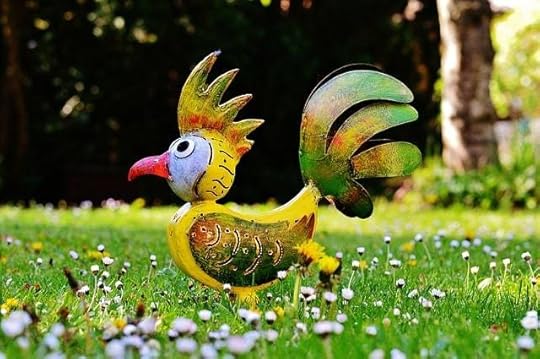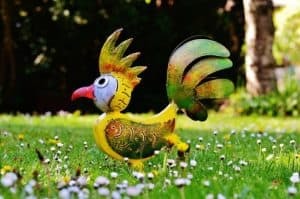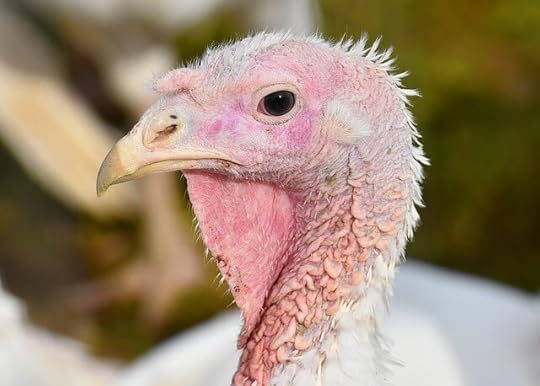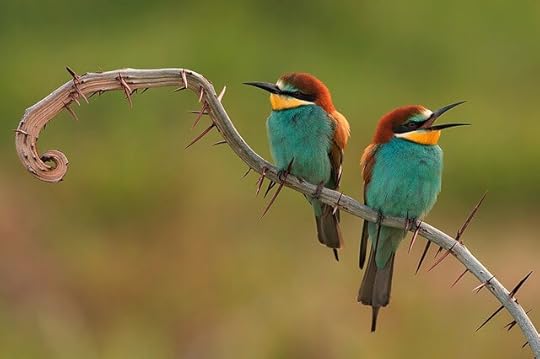Kris Spisak's Blog, page 15
December 6, 2018
Writing Tip 368: Should you “Toll” or “Troll” the Yuletide Carol? (video)

Think fast: how do you sing this classic holiday song?
Join 750+ subscribers and sign-up for my writing and editing email newsletter for more tips like this.
The post Writing Tip 368: Should you “Toll” or “Troll” the Yuletide Carol? (video) appeared first on Kris Spisak.
Writing Tip 367: Should you “Toll” or “Troll” the Yuletide Carol? (video)

Think fast: how do you sing this classic holiday song?
Join 750+ subscribers and sign-up for my writing and editing email newsletter for more tips like this.
The post Writing Tip 367: Should you “Toll” or “Troll” the Yuletide Carol? (video) appeared first on Kris Spisak.
December 1, 2018
Editing Flash Sale!

 Every year at the end of NaNoWriMo, a celebration is in order. So many writers did so much great work. It’s astounding.
Every year at the end of NaNoWriMo, a celebration is in order. So many writers did so much great work. It’s astounding.
But that work is not yet ready for querying or self-publishing. Wait, writers! Don’t do it yet! (As someone who always cautions against too many exclamation points, you can tell how serious I am about this.)
Books need time to breathe. They need the eyes of people besides the author (and besides the author’s mom). Because I want to make sure every book gets the best chance possible, I’m holding a 5-day-only manuscript critique and substantive edit flash sale. All 2019 manuscript critiques and substantive edits booked by December 5, 2018 for fiction projects will have a 10% discount.
Looking for a close analysis of your manuscript? Contact me today and mention this flash sale for your discount.
What is a Manuscript Critique?
Everyone needs a beta-reader—someone to examine the finished book as a whole. Are the characters believable? Does the story begin where it should? Does the plot work? Is it structured successfully? Is the point of view effective? Long before copyediting or line editing, before the final proof, projects can greatly benefit from the perspective of an unbiased reader—better yet when that unbiased reader is a professional editor. Manuscript Critiques produce a multi-page analysis of your book, breaking down what is done well and what could be better.
What is a Substantive Edit?
This heavy editing process involves an examination of clarity, logic, structure, and pacing, as well as plot, character, and setting development. More than a basic proofread, a substantive edit focuses on word usage, tone, style, voice, and total writing strength. Notes and corrections will be given on a page by page basis, and overall project commentary will also be included.
I invite you to learn more about my editing work, including pricing, here.
What are my editing clients saying?
My clients have gained literary agents, become Amazon best-sellers, and landed book deals with major publishers. Here’s what some of them had to say about our editing partnerships:
“I was hoping to obtain an excellent editor and got that and so much more with Kris Spisak. Not only was Kris’s meticulous attention to detail exemplary, her insight was invaluable to the overall success of my manuscript. As well as a thorough grammatical review of my work, I received a comprehensive overview that greatly enhanced the structure of my novel. Kris was open and available to me throughout the process, provided well-considered advice, and went above and beyond to ensure all my expectations were met by our prearranged deadline. I cannot recommend Kris’s services more highly, and look forward to working with her again in the future. “
-T. Marie Vandelly, debut psychological thriller author (Theme Music, forthcoming from Penguin-Random House)
“The detailed critique I received from Kris Spisak was well-written and easy to decipher. She found holes in the story I didn’t realize were there. Her valuable input took the novel from okay to can’t-put-down, and I can’t wait to work with her on the next one!”
–Bess George, romantic suspense author (Family Illusions)
“Kris Spisak’s editing far exceeded my expectations. She slew excessive commas, brought order to misplaced modifiers, made straight any flub-ups in POV, and delivered an edit on time and with insightful comments about both story and craft. Highly recommended.”
–Julie Valerie, debut women’s fiction author (Holly Banks Full of Angst, forthcoming from Lake Union/Amazon Publishing)
“Kris Spisak treated my first novel as though it was her own. Her manuscript critique was thorough and thoughtful. I couldn’t have asked for a better coach. Stonewall Revival is a significantly better, tighter, stronger debut thanks to her guidance. I’ll be seeking her expertise again for my next book.”
-Thomas Michael Garguilo, debut author of fiction (Stonewall Revival)
“[The copyedit] I got back from Kris was gloriously beyond simple punctuation and grammar remarks. It was nothing short of a mini masters class in creative writing.”
–Karen A. Chase, historical fiction author (Carrying Independence)
The writing process can be a roller-coaster of pride, determination, angst, worry, and joy. Make sure you’re giving yourself the best chance possible.
Questions? Contact me today. I’d love to hear what you’re working on.
-Kris
The post Editing Flash Sale! appeared first on Kris Spisak.
November 29, 2018
Writing Tip 367: “Season’s Greetings” or “Seasons Greetings”


And as a reminder for all the shoppers out there: if there’s a writer or book-lover on your list, holiday shopping really shouldn’t be that hard. Indie bookstore gift certificates, a nice journal, an awesome pen, litograph accessories or home decor. Some people can be hard to shop for but language devotees shouldn’t be among that group.
Yes, this is the moment every year where I have to share my reminder about how to make your last name plural on your Christmas cards (hint: no apostrophe—please, no apostrophe!), but that’s not the end of our holiday punctuation conversation.
Forget the question of whether to say “Merry Christmas” or “Happy Holidays.” Is it “Season’s Greetings” or “Seasons Greetings”? Should we just return all those holiday card apostrophes like that awkward office Secret Santa present that joyously came with a gift receipt?
Maybe this is tricky, but there’s no reason for overthinking this one. If you’re wishing someone greetings of the season, you’re wishing “season’s greetings.” The apostrophe is correct. It’s possessive.
The exact origin of “season’s greetings” is unclear, going perhaps as far back as the 1500s according to some sources, but it’s been used commonly at least since the mid-1800s. And the waves of confusion over this expression’s apostrophe have returned time and time again, peaking between 1907 and 1926, again in the 1940s, and then pretty consistently since 1977. Personally, I’m curious about the moment in 1926 and in 1949 that brought the population back to clarity on this issue, and how can we repeat that?
Sure, I have lots of missions this time of year. They range from teaching everyone to be as educated about nausea as the Grinch to questioning the word choice and punctuation of your favorite holiday songs (Are we “tolling” or “trolling” those Yuletime carols? Is Rudolph really the most famous reindeer of all? Where does the comma go in “God bless you merry gentlemen“?).
We don’t need to wait until New Year’s Resolutions—ooh, look another possessive comma!—to get our communications right.
Join 750+ subscribers and sign-up for my writing and editing email newsletter for more tips like this.
The post Writing Tip 367: “Season’s Greetings” or “Seasons Greetings” appeared first on Kris Spisak.
Writing Tip 366: “Season’s Greetings” or “Seasons Greetings”


And as a reminder for all the shoppers out there: if there’s a writer or book-lover on your list, holiday shopping really shouldn’t be that hard. Indie bookstore gift certificates, a nice journal, an awesome pen, litograph accessories or home decor. Some people can be hard to shop for but language devotees shouldn’t be among that group.
Yes, this is the moment every year where I have to share my reminder about how to make your last name plural on your Christmas cards (hint: no apostrophe—please, no apostrophe!), but that’s not the end of our holiday punctuation conversation.
Forget the question of whether to say “Merry Christmas” or “Happy Holidays.” Is it “Season’s Greetings” or “Seasons Greetings”? Should we just return all those holiday card apostrophes like that awkward office Secret Santa present that joyously came with a gift receipt?
Maybe this is tricky, but there’s no reason for overthinking this one. If you’re wishing someone greetings of the season, you’re wishing “season’s greetings.” The apostrophe is correct. It’s possessive.
The exact origin of “season’s greetings” is unclear, going perhaps as far back as the 1500s according to some sources, but it’s been used commonly at least since the mid-1800s. And the waves of confusion over this expression’s apostrophe have returned time and time again, peaking between 1907 and 1926, again in the 1940s, and then pretty consistently since 1977. Personally, I’m curious about the moment in 1926 and in 1949 that brought the population back to clarity on this issue, and how can we repeat that?
Sure, I have lots of missions this time of year. They range from teaching everyone to be as educated about nausea as the Grinch to questioning the word choice and punctuation of your favorite holiday songs (Are we “tolling” or “trolling” those Yuletime carols? Is Rudolph really the most famous reindeer of all? Where does the comma go in “God bless you merry gentlemen“?).
We don’t need to wait until New Year’s Resolutions—ooh, look another possessive comma!—to get our communications right.
Join 750+ subscribers and sign-up for my writing and editing email newsletter for more tips like this.
The post Writing Tip 366: “Season’s Greetings” or “Seasons Greetings” appeared first on Kris Spisak.
November 27, 2018
S1: E12 – Don’t Meddle with My Metal Medal (or my Oranges)



At twelve months old, babies are already beginning to recognize “adjacent relationships” of words, how language fits together to organize itself. The learning process with listening, speaking, and writing, begins there and often lasts for a lifetime.
There’s no medal awarded for correctness, but a strong command of your words is one way to show your mettle. But we’ll get back to that.
Episode 12: Don’t Meddle with my Metal Medal (or my Oranges)
Approximate transcript:
The problem is that the English language is not always logical. It comes from the North Germanic languages spoken by the Scandinavians during the 8th and 9th centuries, influences of the conquering Normans who brought the Romance languages into the mix. And Early modern English—think the language of Shakespeare—borrows greatly from Greek and Latin, as well as more French, German, and Dutch.
From that wild mix, you get words like the Old English term“juke,” meaning dancing, where we get our modern word “jukebox.” Or maybe “modern” isn’t accurate. Retro, maybe.
And to answer it once and for all whether the fruit or the color had its name first, the word “orange” came to English from a Sanskrit word, when Arab traders brought the orange colored fruit to Europe—specifically a sour version to Sicily around 1100 and later the sweet version we know today around 1500. The color orange doesn’t occur in nature widely. There was no word for this color in English and no knowledge of this fruit before this time. Hence English gathered a new food word and a new color word. It’s also true that there is no rhyme for the word “orange,” but you probably already knew that
The complex language we have today comes with a complex story. And that is before totes, awesomesauce, and hashtag OMG.
But the Words You Know podcast is here to dive in. This season, we “dove” in, or should I say we “dived” in? “Dove” vs. “dived”? The conversation never stops.
To answer that one, it’s usually “dove” on the west side of the Atlantic. Americans and Canadians have largely shifted to this newer form of the word that mimics the past tense style of “drive/drove.” British English still favors the original form “dived.”
It’s complicated. I know. When it comes to the language trickling out of people’s mouths, I don’t like to meddle. No one likes that person who corrects grammar in the airport, in your office’s break room, or with a nudge of an elbow at your favorite new craft brewery (I’m in Richmond, Virginia, and man, do I love this town).
However, it is up to each of us to do better. Don’t call out your friend. Maybe discretely slip them a copy of a playful word choice book if you feel so inclined, but it’s time for you to focus on you. Smartphone signatures apologizing for typos do not actually make it okay. It’s not an invitation for others to meddle in your writing affairs, but it is an acknowledgement that you’re okay with occasional sloppiness.
Meddle. I keep using that word. Let me dive in there for a second.

I wouldn’t want to meddle when this metal chicken appeared in my neighbor’s yard. Maybe they earned it somehow in lieu of a medal?
Tough times can show your true mettle, but perhaps if you were a former Olympian, tough times might make you pull out your medal, which is made of metal. I won’t ask you too much about that though, because I don’t want to meddle.
Yes, I could see how these four words could be confusing at first glance. Some mistakes between them might be typos, but often, I believe, it’s an ignorance of the word “mettle.”
Showing your strength and fortitude isn’t showing your metal, even though I could see why some logic might take you there.
“Mettle” means to have a strong character, to be courageous, or to have an even temperament.
“Metal” is a hard substance that your chemistry teacher, a geologist, or an electrician could probably tell you all about. If you’re into hair bands, you might know of another kind of metal (music).
A “medal” is an award for achievement or bravery that is often made of metal.
To “meddle” means to put your nose in someone else’s business.
Should you get a medal for knowing these differences? Maybe not, but you should feel pretty good about yourself anyway.
Meddle. Mettle. Metal. Medal. There are so many words you should know. There are so many words we can handle better. There are so many words that are just simply fascinating.
This is it for season 1, folks. For those of you following along with every new episode, Season 2 will begin in January – after we ring in the new year, or is it bring in the new year… I’m going to leave you hanging right there.
I am Kris Spisak, author of Get a Grip on Your Grammar, and I’m ready for your moments of temporary hesitation or bewilderment. I’ll also have some new book news to share when we return for season 2 so stay tuned for that.
Until then…
Words. Language. Communications. You’ve got this.
Join 750+ subscribers and sign-up for my writing and editing email newsletter for more tips like this.
And don’t forget to subscribe to this podcast (via Apple Podcasts, Android, Google Podcasts, Stitcher, or RSS) so you’ll never miss out on another word you should know. Like what you heard? Rate my show on iTunes or wherever you listen.
Contact me today if you have any language questions for a future episode. I’d love to hear from you!
The post S1: E12 – Don’t Meddle with My Metal Medal (or my Oranges) appeared first on Kris Spisak.
Episode 12: Don’t Meddle with My Metal Medal (or my Oranges)


At twelve months old, babies are already beginning to recognize “adjacent relationships” of words, how language fits together to organize itself. The learning process with listening, speaking, and writing, begins there and often lasts for a lifetime.
There’s no medal awarded for correctness, but a strong command of your words is one way to show your mettle. But we’ll get back to that.
Episode 12: Don’t Meddle with my Metal Medal (or my Oranges)
Approximate transcript:
The problem is that the English language is not always logical. It comes from the North Germanic languages spoken by the Scandinavians during the 8th and 9th centuries, influences of the conquering Normans who brought the Romance languages into the mix. And Early modern English—think the language of Shakespeare—borrows greatly from Greek and Latin, as well as more French, German, and Dutch.
From that wild mix, you get words like the Old English term“juke,” meaning dancing, where we get our modern word “jukebox.” Or maybe “modern” isn’t accurate. Retro, maybe.
And to answer it once and for all whether the fruit or the color had its name first, the word “orange” came to English from a Sanskrit word, when Arab traders brought the orange colored fruit to Europe—specifically a sour version to Sicily around 1100 and later the sweet version we know today around 1500. The color orange doesn’t occur in nature widely. There was no word for this color in English and no knowledge of this fruit before this time. Hence English gathered a new food word and a new color word. It’s also true that there is no rhyme for the word “orange,” but you probably already knew that
The complex language we have today comes with a complex story. And that is before totes, awesomesauce, and hashtag OMG.
But the Words You Know podcast is here to dive in. This season, we “dove” in, or should I say we “dived” in? “Dove” vs. “dived”? The conversation never stops.
To answer that one, it’s usually “dove” on the west side of the Atlantic. Americans and Canadians have largely shifted to this newer form of the word that mimics the past tense style of “drive/drove.” British English still favors the original form “dived.”
It’s complicated. I know. When it comes to the language trickling out of people’s mouths, I don’t like to meddle. No one likes that person who corrects grammar in the airport, in your office’s break room, or with a nudge of an elbow at your favorite new craft brewery (I’m in Richmond, Virginia, and man, do I love this town).
However, it is up to each of us to do better. Don’t call out your friend. Maybe discretely slip them a copy of a playful word choice book if you feel so inclined, but it’s time for you to focus on you. Smartphone signatures apologizing for typos do not actually make it okay. It’s not an invitation for others to meddle in your writing affairs, but it is an acknowledgement that you’re okay with occasional sloppiness.
Meddle. I keep using that word. Let me dive in there for a second.

I wouldn’t want to meddle when this metal chicken appeared in my neighbor’s yard. Maybe they earned it somehow in lieu of a medal?
Tough times can show your true mettle, but perhaps if you were a former Olympian, tough times might make you pull out your medal, which is made of metal. I won’t ask you too much about that though, because I don’t want to meddle.
Yes, I could see how these four words could be confusing at first glance. Some mistakes between them might be typos, but often, I believe, it’s an ignorance of the word “mettle.”
Showing your strength and fortitude isn’t showing your metal, even though I could see why some logic might take you there.
“Mettle” means to have a strong character, to be courageous, or to have an even temperament.
“Metal” is a hard substance that your chemistry teacher, a geologist, or an electrician could probably tell you all about. If you’re into hair bands, you might know of another kind of metal (music).
A “medal” is an award for achievement or bravery that is often made of metal.
To “meddle” means to put your nose in someone else’s business.
Should you get a medal for knowing these differences? Maybe not, but you should feel pretty good about yourself anyway.
Meddle. Mettle. Metal. Medal. There are so many words you should know. There are so many words we can handle better. There are so many words that are just simply fascinating.
This is it for season 1, folks. For those of you following along with every new episode, Season 2 will begin in January – after we ring in the new year, or is it bring in the new year… I’m going to leave you hanging right there.
I am Kris Spisak, author of Get a Grip on Your Grammar, and I’m ready for your moments of temporary hesitation or bewilderment. I’ll also have some new book news to share when we return for season 2 so stay tuned for that.
Until then…
Words. Language. Communications. You’ve got this.
Join 750+ subscribers and sign-up for my writing and editing email newsletter for more tips like this.
And don’t forget to subscribe to this podcast (via Apple Podcasts, Android, Google Podcasts, Stitcher, or RSS) so you’ll never miss out on another word you should know. Like what you heard? Rate my show on iTunes or wherever you listen.
Contact me today if you have any language questions for a future episode. I’d love to hear from you!
The post Episode 12: Don’t Meddle with My Metal Medal (or my Oranges) appeared first on Kris Spisak.
November 20, 2018
S1: E11 – That “turkey” isn’t from Turkey



Now that we’ve established whether it’s “prouder” or “more proud” than a peacock in last week’s episode, I want to keep talking about birds. Why? Because calling a North American turkey a “turkey” is up there with the earliest of #fakenews. But, accuracy has never been the English language’s strong suit.
It’s the week of Thanksgiving in the United States, and this is the time of year one question is asked time and time again:
Why on earth do we call a turkey a “turkey”?
Episode 11: That “turkey” isn’t from Turkey
Approximate transcript:

Yep, this guy isn’t amused by the geographical confusion.
There is so much confusion in this bird’s name. It does actually connect with the country Turkey, though. Are turkeys from Turkey? Not at all. But here is the origin story that goes along with that game fowl on your Thanksgiving table.
It begins with a different bird, a guinea fowl that was historically imported from most likely Madagascar or Ethiopia via Turkey to Europe. When the North American bird was first brought to Europe in the 1500s, many assumed it was related to this guinea fowl that arrived via Turkey, so the new bird became known as a “Turkey.”
Others, far more savvy, or assuming themselves to be, knew that this was a different bird than the African guinea fowl. They knew that this bird came from across the Atlantic Ocean. Of course, at the time, many thought that across that ocean lay India, so rather than calling a North American turkey, “a turkey,” the French called this big bird a poulet d’inde, or “chicken from India.” Today, this has been contracted to dinde, but its confused origin story still lingers, doesn’t it? Similar to the French, the Dutch word for “turkey” translates to “hen from Calcutta.”
Who knew this North American fowl’s name would be so fouled up?
But this leads me to another question…

It’s a bird! It’s a plane! It’s a fowl?
Every year around Thanksgiving, someone usually asks me, “What is the difference between ‘bird’ and ‘fowl’?” And it’s finally time to address it in writing.
“Fowl” comes from the from the Old English word fugel, which is related to the Latin word flēogan, which means to fly. A long time ago, “fowl” was used to represent birds of any kind, and this usage still sneaks out today; however, most sources seem to agree that there is a difference between these two words.
“Fowl” is used to refer to waterfowl, such as ducks, swans, and geese; game fowl, such as turkey or pheasant; or domesticated barnyard birds like chickens. In the food industry, “fowl” is often used to reference birds that are commonly eaten or the meat of these birds in a way that’s synonymous with “poultry.”
“Birds” are any members of the animal class Aves. They are warm-blooded, lay eggs, have feathers, and usually fly.
Thus, that Thanksgiving turkey is both a fowl and a bird, but that songbird outside your window is a bird, most likely not a fowl. Unless you have a singing chicken, which would be pretty cool and perhaps the inspiration for a new animated film. That animated film’s name could be “Fowl,” which could be a fun play on the word “foul,” which would most likely be a good descriptor of the animal’s singing voice. (For more details on this pair, see Get a Grip on Your Grammar).
I hope this solves it for you.
Birds, fowls, turkeys … not from Turkey.
This is the second to last episode of season 1, and I haven’t even had a chance to talk about decorating your communication with ellipses ( … ), those lovely dot, dot, dots, that you drop in where you don’t complete your thoughts, letting your sentences dangle and fade off into the sunset.
You do it in email and in text. I know you do. I’m all about festivities and confetti, but that’s not the point of that punctuation. I swear. It doesn’t make your holiday table more exuberant.
May I issue a challenge to rein in those decorative dots? They aren’t really serving a purpose besides the interior design of your message. You can do better.
And now, if I pause… I wonder if you hear the ellipses when I speak…
Dot dot dot. So many dots.
You are living in a time when more people write than ever before in human history. How awesome is that? Let’s just try to do our best folks.
Though I know it can be hard when that tryptophan kicks in.
Join 750+ subscribers and sign-up for my writing and editing email newsletter for more tips like this.
And don’t forget to subscribe to this podcast (via Apple Podcasts, Android, Google Podcasts, Stitcher, or RSS) so you’ll never miss out on another word you should know. Like what you heard? Rate my show on iTunes or wherever you listen.
Contact me today if you have any language questions for a future episode. I’d love to hear from you!
The post S1: E11 – That “turkey” isn’t from Turkey appeared first on Kris Spisak.
Episode 11: That “turkey” isn’t from Turkey


Now that we’ve established whether it’s “prouder” or “more proud” than a peacock in last week’s episode, I want to keep talking about birds. Why? Because calling a North American turkey a “turkey” is up there with the earliest of #fakenews. But, accuracy has never been the English language’s strong suit.
It’s the week of Thanksgiving in the United States, and this is the time of year one question is asked time and time again:
Why on earth do we call a turkey a “turkey”?
Episode 11: That “turkey” isn’t from Turkey
Approximate transcript:

Yep, this guy isn’t amused by the geographical confusion.
There is so much confusion in this bird’s name. It does actually connect with the country Turkey, though. Are turkeys from Turkey? Not at all. But here is the origin story that goes along with that game fowl on your Thanksgiving table.
It begins with a different bird, a guinea fowl that was historically imported from most likely Madagascar or Ethiopia via Turkey to Europe. When the North American bird was first brought to Europe in the 1500s, many assumed it was related to this guinea fowl that arrived via Turkey, so the new bird became known as a “Turkey.”
Others, far more savvy, or assuming themselves to be, knew that this was a different bird than the African guinea fowl. They knew that this bird came from across the Atlantic Ocean. Of course, at the time, many thought that across that ocean lay India, so rather than calling a North American turkey, “a turkey,” the French called this big bird a poulet d’inde, or “chicken from India.” Today, this has been contracted to dinde, but its confused origin story still lingers, doesn’t it? Similar to the French, the Dutch word for “turkey” translates to “hen from Calcutta.”
Who knew this North American fowl’s name would be so fouled up?
But this leads me to another question…

It’s a bird! It’s a plane! It’s a fowl?
Every year around Thanksgiving, someone usually asks me, “What is the difference between ‘bird’ and ‘fowl’?” And it’s finally time to address it in writing.
“Fowl” comes from the from the Old English word fugel, which is related to the Latin word flēogan, which means to fly. A long time ago, “fowl” was used to represent birds of any kind, and this usage still sneaks out today; however, most sources seem to agree that there is a difference between these two words.
“Fowl” is used to refer to waterfowl, such as ducks, swans, and geese; game fowl, such as turkey or pheasant; or domesticated barnyard birds like chickens. In the food industry, “fowl” is often used to reference birds that are commonly eaten or the meat of these birds in a way that’s synonymous with “poultry.”
“Birds” are any members of the animal class Aves. They are warm-blooded, lay eggs, have feathers, and usually fly.
Thus, that Thanksgiving turkey is both a fowl and a bird, but that songbird outside your window is a bird, most likely not a fowl. Unless you have a singing chicken, which would be pretty cool and perhaps the inspiration for a new animated film. That animated film’s name could be “Fowl,” which could be a fun play on the word “foul,” which would most likely be a good descriptor of the animal’s singing voice. (For more details on this pair, see Get a Grip on Your Grammar).
I hope this solves it for you.
Birds, fowls, turkeys … not from Turkey.
This is the second to last episode of season 1, and I haven’t even had a chance to talk about decorating your communication with ellipses ( … ), those lovely dot, dot, dots, that you drop in where you don’t complete your thoughts, letting your sentences dangle and fade off into the sunset.
You do it in email and in text. I know you do. I’m all about festivities and confetti, but that’s not the point of that punctuation. I swear. It doesn’t make your holiday table more exuberant.
May I issue a challenge to rein in those decorative dots? They aren’t really serving a purpose besides the interior design of your message. You can do better.
And now, if I pause… I wonder if you hear the ellipses when I speak…
Dot dot dot. So many dots.
You are living in a time when more people write than ever before in human history. How awesome is that? Let’s just try to do our best folks.
Though I know it can be hard when that tryptophan kicks in.
Join 750+ subscribers and sign-up for my writing and editing email newsletter for more tips like this.
And don’t forget to subscribe to this podcast (via Apple Podcasts, Android, Google Podcasts, Stitcher, or RSS) so you’ll never miss out on another word you should know. Like what you heard? Rate my show on iTunes or wherever you listen.
Contact me today if you have any language questions for a future episode. I’d love to hear from you!
The post Episode 11: That “turkey” isn’t from Turkey appeared first on Kris Spisak.
November 15, 2018
Writing Tip 366: “Hiccup” vs. “Hiccough”


This bird might not actually be hiccuping (hiccoughing?), but a tree like this might be enough to frighten them away if he was.
Sure, spelling the word “onomatopoeia” might strike you out of the spelling bee, but don’t you love that this word exists that refers to words that were formed in imitation of the sound they refer to.
Boom. Squeak. Purr. Buzz.
And then there’s “hiccup.” Or is it “hiccough”? They’re both pronounced the same, a wonderful imitation of that involuntary noise that comes from a contraction in the diaphragm and a response in the vocal chord.
If you’re like me, there’s no question here. “Hiccup” must surely be the standard spelling, so why are we even discussing it?
But this isn’t the end of the story.
It doesn’t have much to do with a “cough,” but then again, there are no “cups” involved either.
Before we get to the spelling, though, I have to point out that the earliest form of this word derived from the Old English word ælfsogoða, because it was thought that the involuntary spasm was caused by elves. I love this. They weren’t necessarily evil elves or the demons that prompted a “God bless you” after a sneeze. But they were certainly up to something.
“Hiccup” was the first version of this word, appearing in the late 1500s, and it acted as both a noun and a verb from the start (i.e., one could have the hiccups, or one could hiccup).
“Hiccough,” it seems, stemmed from an assumed link between hiccuping and coughing—both noises made by the body, true, but they aren’t actually connected.
The Google Ngram that analyzes the popularity of “hiccup” vs. “hiccough” is actually fascinating. “Hiccup” was the first leader, with “hiccough” jumping into first place for a short time in the late 1600s. “Hiccup” returned to the more popular spot until 1736, where there was another “hiccough” fad that lasted just shy of a decade. It faded to the number two spot again until its last and most triumphant period, which was between 1849 and 1949—a full 100 years of “hiccough” glory—but since then, “hiccup” has been the clear favorite. “Hiccup” has had a few hiccups in its word history apparently.
Hiccup. It’s onomatopoeia in action. As for elves or no elves, you can decide.
Join 750+ subscribers and sign-up for my writing and editing email newsletter for more tips like this.
The post Writing Tip 366: “Hiccup” vs. “Hiccough” appeared first on Kris Spisak.



